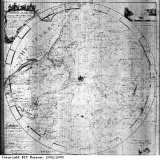Estates within 10 miles of Bristol
Dyrham House in Dyrham, east of Bristol, had ancient origins. Eventually, it came to be owned by William Blathwayt through his marriage to Mary Wynter in 1686. The Wynter family had been involved in the Caribbean for a long time. Blathwayt had been Secretary of State for Kings James II and William III and was Member of Parliament for Bath until 1710. He took an active interest in the African slave trade, promoting it along with the Bristol merchant and writer John Cary. Blathwayt personally benefited from gifts and bribes connected with his various government jobs concerned with the Caribbean islands.
Over Court (now demolished) at Almondsbury, north of Bristol, was an Elizabethan manor. Bristol’s most important slave-trader Sir James Laroche purchased Over Court sometime around the mid-1700s. Laroche had at least two African servants who lived with him at Over Court, James Long (died 17 March 1773) and Charles Morson (died 16 February 1776). A survey of 1791 mentions a stone which Laroche put up in their memory.
Clevedon Court is near the town of Clevedon on the mouth of the River Severn. It was bought by Sir Abraham Elton I, in about 1710. Abraham Elton was Mayor and later Member of Parliament for Bristol. His son Abraham II was involved in the brass industry, which was itself related to the slave trade. Brass pots and pans were a large part of the slave ships’ cargoes of trade goods to Africa. Elton’s brothers Isaac and Jacob invested directly in slave ships. The Elton family still live in Clevedon Court, but it is now owned by the National Trust.
Tockington Court in Tockington, north of Bristol, was purchased by the merchant and slave-ship investor Lewis Casamajor (died 1743). It was sold in the 1780s to Samuel Peach, a Bristol banker and slave-ship owner. Peach was the father-in-law of Henry Cruger, Member of Parliament for Bristol in the 1770s and 1780s, and himself a Caribbean plantation owner and son of an American slave-trader.
Cleve Hill House (now demolished) was at Downend, near the Fishponds area in east Bristol. It was an old manor which had been rebuilt in the early 1700s. It was inherited in 1736 by one Charles Bragge. Bragge married into the Bathurst family. The Bathursts had long been involved in African and Caribbean dealings. They were also involved in the slave trade itself. Benjamin Bathurst was Deputy Governor of the Leeward Islands in the Caribbean in the late 17th century. He was also an investor in the Royal African Company (the London-based company which had control in Britain on all trade with Africa). Bragge’s son Charles took the name Bathurst on his marriage. He was a member of Bristol’s Society of Merchant Venturers (an elite body of Bristol merchants involved in overseas trade). He also served as a Tory Member of Parliament for Bristol from 1796 to 1807. During this period the campaign for the end of the slave trade, called Abolition, was being discussed and finally agreed to in Parliament (Bathurst was for slavery). He then became Treasurer of the Navy. Bathurst sold Cleve Hill House to the slave merchant John Gordon in 1790. In 1804 both the house and the estate were bought by Stephen Cave Esq., whose family had extensive interests in Caribbean slave plantations.



